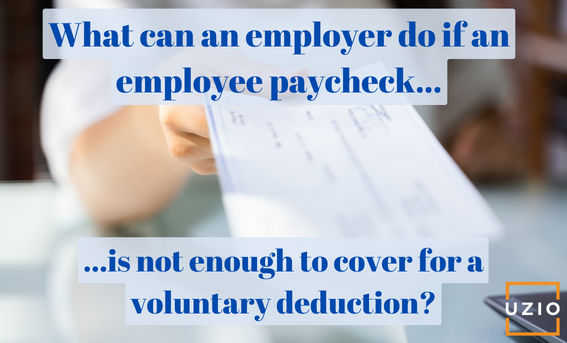
What can an employer do if an employee paycheck is not enough to cover for a voluntary deduction like Health Insurance Premium?
Quick links
Types of Deductions
Employers can make the following three categories of deductions from the employee’s paycheck.
- Mandated by Law: An example would be wage garnishments like child support
- Deductions for Employers convenience: An example would be recovery against overpayment, advances paid to the employee etc.
- Voluntary Deductions: An example would be health benefits premium deduction, charitable deductions etc.
Different Federal and State rules apply for each of these categories In this article, we will focus on rules and regulations an employer should follow while handling Voluntary deductions.
Many states also have minimum wage laws. In cases where an employee is subject to both state and federal minimum wage laws, the employee is entitled to the higher minimum wage.
Administering Voluntary Deductions like Health premium
If employees are enrolled in a Section 125 plan which is an employer-sponsored benefit plan that gives employees access to certain taxable and nontaxable pretax benefits, they can set aside insurance premiums and other funds pretax, which can then go toward certain qualified medical and child care expenses. Depending on where they live, participating employees can save from 28% to 48% in combined federal, state, and local taxes on a variety of items that they typically already purchase with out-of-pocket post-tax funds.
At the time of enrollment, employees agree to have employers deduct their portion of the premium on a pre-tax basis. It all works great if the employee paycheck is large enough to cover the deductions. The challenge arises when the employee is either not working for a short period of time but still is covered by the health benefit plan or the employee has not worked enough hours so that his/her paycheck can not cover the benefit deductions.
Because the employee’s health benefits are still active, the employer is responsible for paying the health insurance carrier the full premium amount even though the employee is not contributing his/her portion of the premium. In such cases, the employer would have to keep track of the deductions owed by the employee and recover the amount owed from future paychecks.
In certain industries, like construction or landscaping, the work is seasonal, meaning employees work only part of the year and so there are months when they are not getting paid because they are not working but are still covered under the employer benefit plan. Employers in these instances struggle to keep track of all the deductions owed if they are doing it manually. Some payroll systems like Uzio, provide employers the ability to automatically track deduction balance. Not only that, the Uzio system also allows the employers to set up the deduction arrear processing method so that they can decide, after discussion with the employee, how to recover the balance from the employee in the future paychecks.
Recommended Reading: Biggest pain point with Payroll and HR software
At any point in time if you feel like connecting with us in this respect, our team is there to help. You can use the link below to book a call with us.
Conclusion
In the current tight job market, employers have to offer a tax advantage benefit like health insurance to be able to attract and retain employees. While they do that, they also need a system to be able to track the deductions owed by employees in cases where employee paychecks are not big enough to cover it. It can be done manually but it leads to extra work and errors. The employer would do well to make sure their payroll system has the feature to track the deductions owed automatically as well as has the ability to set up different methods to recover the owed deductions from future paychecks.





